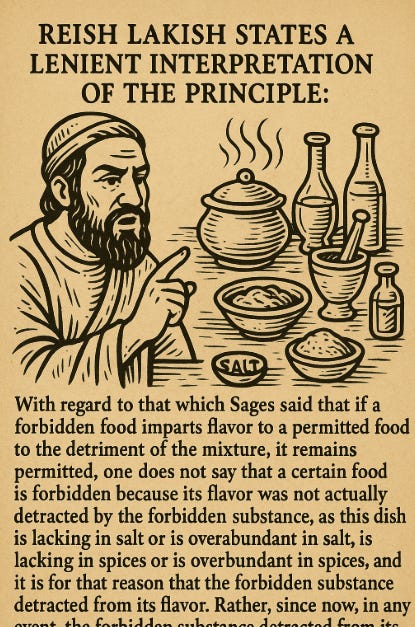Interpreting "Increasing" Negative Taste
Still stuck on Sunday’s daf, Avodah Zarah 67, here’s another curious section.
אָמַר רֵישׁ לָקִישׁ: נוֹתֵן טַעַם לִפְגָם שֶׁאָמְרוּ, לֹא שֶׁיֹּאמְרוּ: קְדֵירָה זוֹ חֲסֵירָה מֶלַח, יְתֵירָה מֶלַח, חֲסֵירָה תַּבְלִין, יְתֵירָה תַּבְלִין, אֶלָּא כֹּל שֶׁאֵין חֲסֵירָה כְּלוּם, וְאֵינָהּ נֶאֱכֶלֶת מִפְּנֵי זֶה.
§ Reish Lakish says: With regard to the principle that the Sages said, that if a forbidden food imparts flavor to a permitted food to the detriment of the mixture it remains permitted, the criterion is not that people would say: This dish is lacking in salt or is overabundant in salt, is lacking in spices or is overabundant in spices, and that is why its flavor was detracted by the forbidden food. Rather, it is referring to any dish that is not lacking in anything, but will not be eaten only because of this forbidden substance that fell into it.
וְאִיכָּא דְּאָמְרִי, אָמַר רֵישׁ לָקִישׁ: נוֹתֵן טַעַם לִפְגָם שֶׁאָמְרוּ, אֵין אוֹמְרִין: קְדֵירָה זוֹ חֲסֵירָה מֶלַח, יְתֵירָה מֶלַח, חֲסֵירָה תַּבְלִין, יְתֵירָה תַּבְלִין, אֶלָּא הַשְׁתָּא מִיהָא הָא פָּגְמָה.
And there are those who say that Reish Lakish states a lenient interpretation of the principle: With regard to that which Sages said that if a forbidden food imparts flavor to a permitted food to the detriment of the mixture, it remains permitted, one does not say that a certain food is forbidden because its flavor was not actually detracted by the forbidden substance, as this dish is lacking in salt or is overabundant in salt, is lacking in spices or is overabundant in spices, and it is for that reason that the forbidden substance detracted from its flavor. Rather, since now, in any event, the forbidden substance detracted from its flavor, it is permitted.
אָמַר רַבִּי אֲבָהוּ אָמַר רַבִּי יוֹחָנָן: כֹּל שֶׁטַּעְמוֹ וּמַמָּשׁוֹ אָסוּר, לוֹקִין עָלָיו, וְזֶהוּ כְּזַיִת בִּכְדֵי אֲכִילַת פְּרָס.
§ Furthermore, with regard to a forbidden food that became mixed with a permitted food, Rabbi Abbahu says that Rabbi Yoḥanan says: In any case where the flavor and substance of the forbidden food are perceptible in the mixture, the mixture is forbidden, and one is flogged for consuming it. And it is a tradition that this is the measure for such a case: One who eats an olive-bulk of the forbidden element in the mixture in the time it takes to eat a half-loaf of bread is liable for eating the forbidden food.
טַעְמוֹ וְלֹא מַמָּשׁוֹ — אָסוּר, וְאֵין לוֹקִין עָלָיו, וְאִם רִיבָּה טַעַם לִפְגָם — מוּתָּר.
But if only the flavor of the forbidden food is recognizable in the mixture, but not its substance, as it was completely dissolved into the permitted food, the mixture is forbidden, but one is not flogged for consuming it. And if the forbidden food amplified the flavor of the permitted food to its detriment, it is permitted.
וְלֵימָא: אִם נָתַן טַעַם לִפְגָם — מוּתָּר! הָא קָמַשְׁמַע לַן, דְּאַף עַל גַּב דְּאִיכָּא מִילֵּי אַחְרָנְיָיתָא דְּפַגְמַהּ בַּהֲדֵיהּ, וְהִלְכְתָא כְּלִישָּׁנָא בָּתְרָא דְּרֵישׁ לָקִישׁ.
The Gemara asks: But then let Rabbi Yoḥanan say: If the forbidden food imparts flavor to the detriment of the mixture, it is permitted. Why does he use the term: Amplified? The Gemara answers that this is what Rabbi Yoḥanan teaches us: That even if there are other substances that detracted from the flavor of the mixture along with the forbidden food, e.g., insufficient salt or excessive seasoning, this is not taken into consideration; since the forbidden food detracted from its flavor, the mixture is permitted. The Gemara comments: And the halakha is in accordance with the last version of the statement of Reish Lakish.
Taking stock of the sugya for a moment, what do we have?
(1) We have an ikka de’amrei, that is, an internal variant within Reish Lakish’s statement. Instead of one being in one manuscript and another in a different manuscript, all our manuscripts have both.
Sometimes, for ikka de’amrei, you will indeed find it distributed in different manuscripts, suggesting that this was the origin — where eventually a scribe joined texts from two manuscripts into the main body. But maybe this ikka de’amrei reflects some early divergence in oral tradition, any time from second scholastic generation Land of Israel, where Reish Lakish operated.
(2) We have an anonymous Aramaic Statement, thus from the Talmudic Narrator, about how we rule, like the second version of Reish Lakish’s statement. וְהִלְכְתָא כְּלִישָּׁנָא בָּתְרָא דְּרֵישׁ לָקִישׁ.
That may imply that the two versions of Reish Lakish was earlier. Now, we can have multiple Stammaic strata (layers), so this concluding Stamma could relate to the earlier Stamma presenting the alternate versions.
(3) Consider the intervening Stammaic statement immediately before the וְהִלְכְתָא, which elaborates on the meaning of Rabbi Yochanan’s phrasing of וְאִם רִיבָּה, instead of the standard אִם נָתַן.
Now, look at Rashi, not on that Stammaic statement, but on Rabbi Yochanan’s statement:
טעמו ולא ממשו - כגון חלב שנפל לקדרה או חלב שנפל נימוח שאין ממשו בעין:
ואם ריבה טעם לפגם - הא ריבה קולא משמע שאע"פ שנפגם מחמת דבר אחר אם הועיל איסור זה לרבות את הפגם מותר:
That is:
And if it increased the negative taste — this language of ריבה implies a leniency, that even if it is impaired because of something else, if this prohibited item helps to increase the impairment, it is permitted.
Why should Rashi bother explaining this in Hebrew? This is precisely what the Talmudic Narrator says in the next sentence, albeit in Aramaic!
I think the answer is that this explanation of the implication of ריבה was not in Rashi’s Talmudic text. It could have been added before Rashi’s time but in a different Talmudic manuscript, or it could have been added in Rishonic times. Regardless, it is not part of the core Talmudic text.
If that passage is late, then maybe the continuation of וְהִלְכְתָא is also late.


